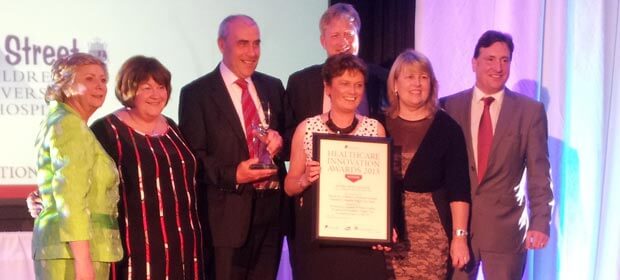Temple Street Children’s University Hospital Paediatric Trigger Tool team won a Biomnis HealthCare Innovation Award this year for Patient Safety for their quality improvement project, writes Eilis Murphy, Quality, Standards & Service Planning Manager.
Temple Street Children’s University Hospital Paediatric Trigger Tool team won the Biomnis HealthCare Innovation Award for Patient Safety for their quality improvement project.

It is titled “Enhancing a Culture of Patient Safety by using the Paediatric Trigger Tool (PTT) to measure Harm”
This project commenced in May 2012 and was initiated as a Quality Improvement project as part of the RCPI Diploma for Leadership and Quality in Healthcare led by Ms Mona Baker CEO, Professor Alf Nicholson, consultant paediatrician, Dr John Fitzsimons, consultant paediatrician and Dr Colin Doherty, consultant neurologist.
The aim of the project is to measure harm and to identify and learn from potential adverse events. It furthermore enhances the voluntary reporting mechanisms already established in the hospital. The tool used by the TSCUH team is the NHS Paediatric Trigger tool and training and ongoing support was provided by Dr. John Fitzsimons. It is a structured method of measuring harm by performing standardised reviews of randomly selected healthcare records of children discharged 30 days previously. It is an unbiased measure of the incidence of harm but more importantly it allows staff to prioritise patient safety improvements and track change over time.
The tool consists of a series of triggers, grouped together to reflect different aspects of care (general care, surgical care, intensive care, medication and pathology). A trigger is a signpost to help reviewers find if any adverse events occurred during the episode of care.
The PTT team in TSCUH consists of three teams of reviewers (nursing, pharmacy and management) and two clinician supervisors with ongoing support and leadership provided by the CEO. Thirty charts are reviewed monthly by the reviewers who then meet as a group with the clinician supervisors where results are discussed and analysed. Harm rates and severity are confirmed as appropriate.
In TSCUH the teams of reviewers look for set “triggers” that suggest that harm may have occurred. When a trigger is found the notes are examined to find root cause and to identify if harm occurred, which is then graded according to an adapted version of the National Coordinating Council for Medication Error Reporting and Prevention (NCC MERP) Index. The TSCUH team defines harm as “something that you would not want to happen to your child as a result of healthcare”.
To date 240 charts have been reviewed with 22 episodes of harm recorded (2.2 per month). The most common category is E (temporary harm to the patient that required intervention). Results are reported through the hospitals Clinical Governance structures with agreed changes implemented as required.
While the PTT commenced as a Quality Improvement project it was important to embed it into the hospitals Patient Safety and Clinical Governance structures to ensure sustainability into the future. Clear Leadership by the CEO, Professor Nicholson and Dr. John Fitzsimons as well as the enthusiasm and dedication of the reviewers and clinical supervisors has ensured this.

